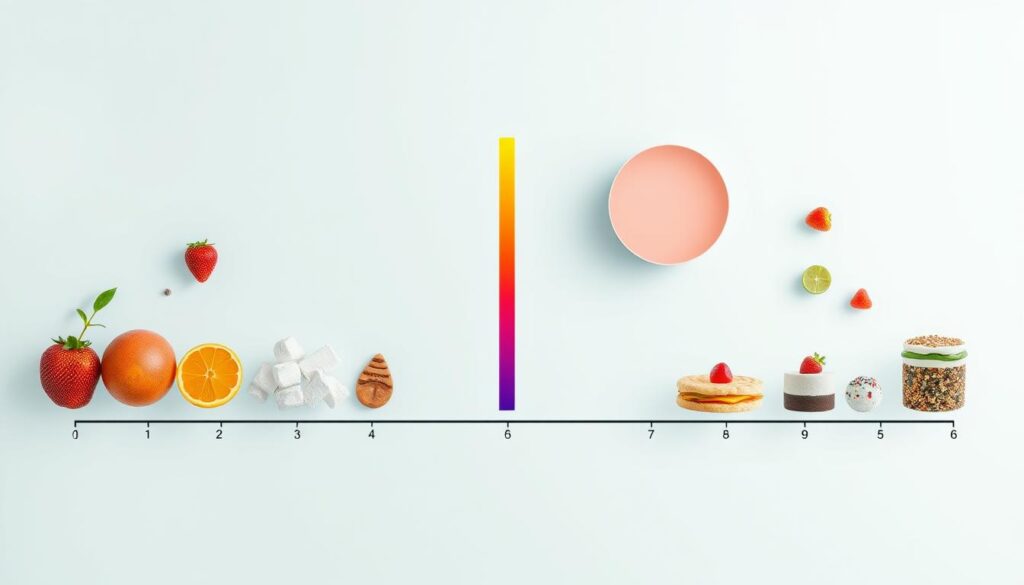Can cutting sugar from your diet really lead to better mental clarity, weight loss, and lower risk of chronic diseases? This could mean a healthier lifestyle and overall wellness.
The average American eats about 6 cups of sugar each week. It’s key to know how sugar affects our bodies and how reducing it can lead to a healthier life.
The average American consumes around 17 teaspoons of sugar every day. This is more than 2–3 times what’s recommended for both men and women. This shows we need to focus on wellness when it comes to sugar intake.
Key Takeaways
- Reducing sugar intake can lead to improved mental clarity and reduced risk of chronic diseases, contributing to overall wellness.
- High sugar consumption is linked to medical conditions such as obesity, diabetes, heart disease, and poor dental health, emphasizing the importance of a healthy lifestyle.
- Cutting sugar from your diet can lead to weight loss and improved hormonal balance, which is related to sexual function and libido, as part of a broader wellness strategy.
- Substituting low- to no-calorie sweetened beverages for sugar-sweetened beverages can lead to reduced body weight and body fat percentage, supporting a healthy lifestyle.
- Research indicates that high-fiber foods may help prevent cravings and contribute to blood sugar regulation, aiding in the pursuit of wellness and a healthy lifestyle.
The Immediate Effects of Reducing Sugar Intake
When people cut down on sugar, big changes happen in their body. Their blood sugar drops, causing physical and mental signs. For those with diabetes, cutting sugar is key to keep blood sugar in check and avoid serious problems.
Right after starting, some might feel headaches and tiredness. Staying hydrated and eating regular meals can help ease these feelings. It’s also important to find healthy snacks to fight off sugar cravings.
First 24 Hours Without Added Sugar
In the first 24 hours, the body starts to adjust to the new diet. Blood sugar levels start to drop. This can cause changes in bowel movements, skin issues, and mood swings.
Managing Initial Sugar Cravings
To fight off sugar cravings, try these tips:
- Eat regular meals to keep blood sugar stable
- Drink plenty of water to stay hydrated
- Choose healthy snacks like fruits and nuts instead of sugary ones
By following these tips, you can cut down sugar intake and control blood sugar levels. This is especially crucial for people with diabetes.
Impact on Your Blood Sugar Levels and Insulin Response
Lowering sugar intake can greatly affect blood sugar levels and how your body responds to insulin. The CDC reports that about 38.4 million people in the U.S. have diabetes. Many, nearly 23%, don’t even know they have it. Eating too much added sugar can make your body less responsive to insulin, raising the risk of type 2 diabetes.
To better control sugar, cut down on added sugars and eat more whole foods. The average American eats 17 teaspoons 71 grams of added sugar every day. This can cause a big jump in blood sugar levels. By choosing the right foods, you can make your body more sensitive to insulin and lower your chance of getting diabetes.
Here are some ways to manage blood sugar levels:
- Drink lots of water. A study showed that drinking at least 34 ounces about 1 liter a day can lower your risk of high blood sugar by 21%
- Eat whole, unprocessed foods like whole grains, fruits, and non-starchy veggies. They have a lower glycemic index than refined carbs
- Don’t overdo it on added sugars and refined carbs. They can cause insulin resistance and increase the risk of type 2 diabetes

By following these tips and eating healthily, you can improve your sugar control and lower your risk of diabetes. It’s important to remember that cutting out all sugars isn’t necessary. It can even lead to eating more fat and high-glycemic-index starches. Finding a balance in sugar control is key to staying healthy.
| Food Type | Glycemic Index |
|---|---|
| Whole grains | Low |
| Fruits | Low-Moderate |
| Non-starchy vegetables | Low |
| Refined carbs | High |
How Avoiding Sugar Changes Your Brain Chemistry
Not eating sugar can really change how your brain works, making you feel better overall. Studies show that sugar can make your brain feel good by releasing dopamine. But too much sugar can mess up your brain’s balance, leading to feelings of sadness and worry.
By cutting down on sugar, you can feel happier and lower your chance of getting depressed or anxious. Eating well and staying active can also help keep your brain in balance. Some benefits of not eating sugar include:
- Improved mood regulation
- Increased cognitive function
- Reduced risk of depression and anxiety
Not eating sugar can also make you less likely to crave it, helping your brain stay steady. This is part of living a healthy lifestyle. Cutting down on sugar can make a big difference in your life, making you happier and healthier.
Sugar can cause headaches, tiredness, and mood swings. But, by changing your diet and lifestyle a bit, you can eat less sugar and feel better overall.
What Does Avoiding Sugar Do to Your Body’s Fat Storage?
Avoiding sugar can greatly affect how your body stores fat. When you eat sugar, it gets stored in your liver and muscles as glycogen. This can cause your body fat to increase. Cutting down on sugar can help improve your body’s shape and lower the risk of serious diseases like heart disease and type 2 diabetes, especially for those with diabetic conditions.
Too much sugar that isn’t used for energy turns into fat, leading to weight gain and insulin resistance. This can cause blood sugar problems. Eating less sugar can make your liver healthier and help you lose weight. You might see these benefits in just days or weeks.
Some main advantages of eating less sugar include:
- Improved liver health
- Weight loss
- Lower risk of heart disease and stroke
- Better sugar level control
By cutting down on added sugar, you can boost your health and lower the chance of chronic diseases. It’s crucial to watch your sugar intake and make smart choices to keep your blood sugar and body shape healthy.

Changes in Energy Levels and Metabolism
Reducing sugar intake can greatly affect energy levels and metabolism. Sugar causes a quick rise in blood sugar, followed by a drop. This leaves people feeling tired and sluggish. By cutting sugar, people can feel more energetic and have a faster metabolism, leading to a healthier life.
A diet low in sugar helps keep energy levels steady. The body uses energy from food better, not just quick sugar fixes. This leads to more energy all day, making it easier to stay active and healthy.
Daily Energy Fluctuations
Energy levels can change a lot during the day, especially after sugary foods. Choosing the right foods can help keep energy stable. This way, people don’t need to rely on sugary snacks, promoting a healthy lifestyle.
Metabolic Rate Adjustments
Reducing sugar intake also boosts metabolism. Sugar can slow down metabolism, making it hard to lose weight. Cutting sugar leads to a faster metabolism, more energy, and a healthier lifestyle.
Impact on Skin Health and Aging Process
The skin is the largest organ in our body and is greatly affected by sugar. Eating too much sugar can cause inflammation and oxidative stress, leading to early aging. A study in JAMA Dermatology found that a diet high in sugar increases acne risk by 54%.
Sugary drinks also raise the risk of acne by 18%. A diet rich in sugar can make psoriasis symptoms worse. Over 7.5 million adults in the U.S. suffer from psoriasis, as reported by the National Psoriasis Foundation. Combining sugar and fat can harm the gut microbiome, causing more inflammation in psoriasis. It’s key to control blood sugar levels to avoid these skin issues.
A UC San Francisco study showed that more sugar daily means more aging. Each gram of sugar increases aging by 7 days. This shows why watching sugar level is crucial to avoid early aging. Eating a diabetic diet full of antioxidants and anti-inflammatory foods can help keep skin healthy.

To keep skin healthy, it’s important to watch blood sugar and sugar intake. Making smart food choices can lower the risk of acne and psoriasis. This helps keep skin looking young and healthy.
Digestive System Transformations
Lowering sugar intake can greatly change the digestive system, helping towards a healthy lifestyle. It positively affects the gut microbiome. This means more good bacteria in the gut, which is key for wellness and health.
A healthy digestive system is vital for feeling good overall. With less sugar, digestion works better. This can make symptoms like bloating and gas go down.
- Improved gut microbiome
- More good bacteria
- Less digestive problems
- Better digestion comfort
Choosing a sugar-reduced diet is a big step towards a healthy lifestyle and better wellness. It can also lower the chance of health issues like digestive problems. The advantages of eating less sugar are obvious.
Long-term Health Benefits of Sugar Reduction
Lowering sugar intake can greatly improve blood sugar control and cut the risk of diabetes. Cutting down on sugar can also lower the risk of heart disease and some cancers. This is because sugar is linked to chronic diseases.
Reducing sugar helps with weight management and heart health. Eating less sugar can help keep a healthy weight. This is key for overall health. It also lowers blood pressure and cholesterol, reducing heart disease risk.

- Improved blood sugar control
- Lower risk of developing diabetes
- Improved weight management
- Improved heart health
Reducing sugar intake offers many long-term health benefits. It improves sugar control and lowers the risk of chronic diseases. By choosing better foods and cutting down on added sugar, people can stay healthy and well.
Common Challenges and How to Overcome Them
Reducing sugar intake can be tough. People often struggle with cravings and staying on a low-sugar diet. To beat these hurdles, staying hydrated, eating regularly, and choosing healthy snacks are key. A healthy lifestyle and wellness come from being aware of sugar and making small changes in what we eat.
One effective way to fight sugar cravings is to eat more protein. Studies show this can cut cravings by up to 60%. Also, reading food labels helps spot hidden sugars in packaged foods. With over 50 names for added sugar, knowing these can guide better choices.
- Eating regular meals to prevent cravings
- Staying hydrated to reduce cravings
- Finding healthy alternatives to sugary snacks
- Increasing protein intake to reduce cravings
By following these tips and watching sugar intake, people can beat common challenges. This leads to a healthy lifestyle and wellness through less sugar consumption.
Conclusion: Embracing a Lower-Sugar Lifestyle
Choosing a lower-sugar lifestyle can greatly improve our health and happiness. Knowing how sugar affects our blood sugar, diabetes risk, and heart health helps us make better choices. Making lasting changes is key, as studies show these can lead to better skin, more energy, and sharper minds.
Starting a lower-sugar life might be tough at first, but the benefits are huge. By eating whole foods and trying natural sweeteners, we can cut down on sugar. Remember, small steps can add up to big changes. So, start this journey with hope, determination, and a focus on your health for the long haul.





